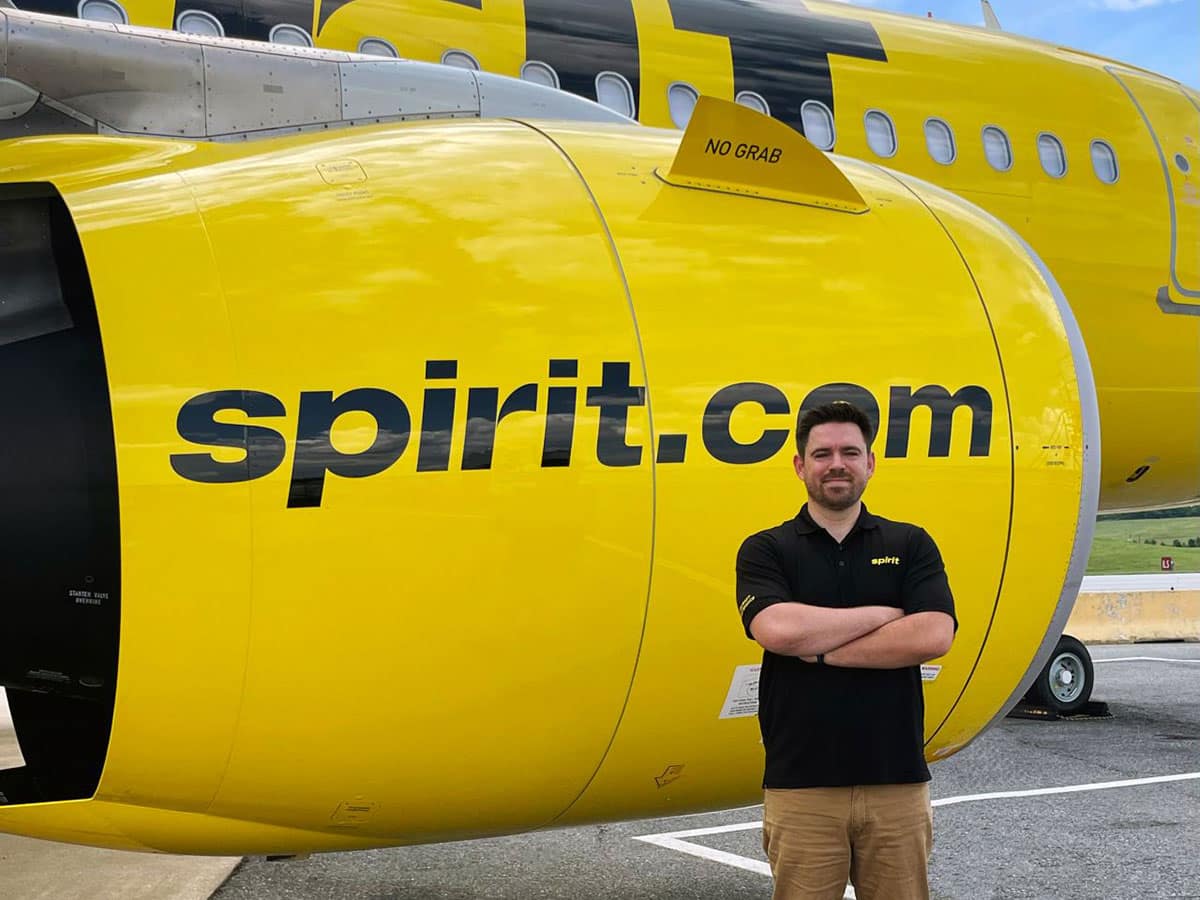Eagle Honored for Contributions to Aviation Maintenance Technician Workforce Development

When Embry-Riddle Aeronautical University student Moritz “Mo” Conrads began working as an aircraft maintenance technician (AMT) at Spirit Airlines in 2016, he never imagined he’d quickly work his way up to becoming a senior maintenance manager at the company.
“My five-year plan keeps getting thrown out the window,” said Conrads. “I would have never believed that I would be where I am now, managing 100 technicians.”
Conrads’ contributions to the field of aircraft maintenance — including the recruitment and mentoring of fellow technicians — also led to him being named a 2023 recipient of the Aircraft Maintenance Technology’s 40 Under 40 Maintenance Professionals Award, after being nominated by Spirit.
There is a high need for aviation maintenance technicians…. According to the Boeing Pilot and Technician Outlook, approximately 690,000 new aviation maintenance technicians will be needed by 2040.
“I feel very honored and thankful,” said Conrads, who works at Spirit Airlines’ operation based out of the Orlando International Airport in Florida. He is also a recruiting manager for the company. “I’m glad AMTs are being recognized for their hard work, and I hope it encourages others.”
That commitment to excellence and lifelong learning is what is currently driving Conrads in his pursuit of a Master of Business Administration in Aviation degree through Embry-Riddle’s Worldwide Campus.
“I was doing some self-reflecting and looking at future goals, and I decided I was ready for the next challenge,” said Conrads. “Embry-Riddle fits my schedule and allows me to be able to fulfill my daily work duties. The flexibility definitely works in my favor.”
That flexibility was critical this past year, he said, when he was busy juggling schoolwork with moving to a new city, planning his wedding and learning his new job in Orlando.
Conrads said he also likes the MBA degree’s focus on aviation because it relates so well to his career and interests.
“Other students in the program are also involved in aviation, so we share similar interests and knowledge of the industry, and we can use each other’s strengths,” he said. “We talk about real-world problems and possible solutions that I can potentially use at work.”
Mentoring Fellow Technicians
Conrads initially became interested in aviation as a child, frequently flying from the U.S. to visit family in Germany.
“I was born near Munich, Germany, and my dad worked in the printing press industry,” said Conrads, who grew up near Naperville, Illinois. “I am mechanically inclined and was always interested in how things worked.”
Conrads started working as a technician at Spirit Airlines in Chicago. After just two years, he moved into a supervisor position at Baltimore-Washington International Airport. A year later, he was promoted to line maintenance manager.
Through his new supervisory roles, he has learned that he enjoys teaching and mentoring other AMTs, especially ones new to the field.
“I teach the people I bring onboard and mentor them to make sure they are doing the right thing and are well-rounded mechanics,” said Conrads. “I try to share some of my experiences with them.”
There is a high need for aviation maintenance technicians, especially with many reaching retirement age in the coming years. According to the Boeing Pilot and Technician Outlook, approximately 690,000 new aviation maintenance technicians will be needed by 2040.
“AMTs are the backbone. If we can’t do the work, the planes can’t fly,” said Conrads. “We shine on night shifts, ensuring planes are serviced and airworthy every morning.”
As one of Spirit’s AMT recruiting managers, Conrads said he tries to find AMTs with the right culture and mindset for the airline.
“I’m looking for AMTs that want to learn and are trying to be better from the time they clock in to the time they clock out,” he said. “I want to be in that mentoring position to help as many people as I can.”
One of his favorite things about working in aviation maintenance is how AMTs work together to overcome any challenges.
“The hard part about the job is dealing with the unknowns, like weather and other difficult scenarios that you can’t control,” he said. “But that is when the team aspect comes in. You never really feel alone, and even if it is a long day, we get the job done together.”

 Melanie Stawicki Azam
Melanie Stawicki Azam